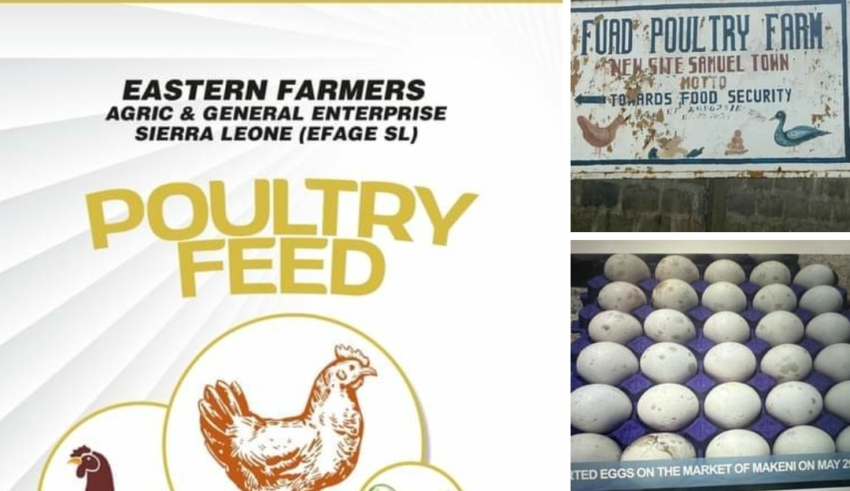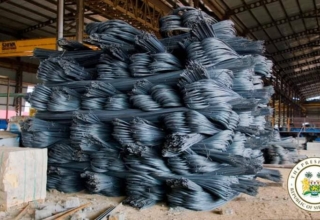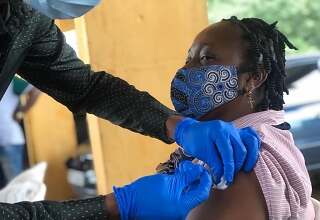
𝐁𝐲 𝐒𝐚𝐡𝐫 𝐋𝐚𝐡𝐚𝐢 𝐉𝐮𝐬𝐮.
Like several other agribusinesses that have great potential for both scale and profitability, poultry farming is a smart decision to make. It is not only a business which is critical to the healthy consumption structure in the world, it is a profitable business that creates jobs and increases income levels of the farmers. However, most of the poultry farms are closing down due to lack of support to access complete poultry feed and power. Starting a complete poultry feed production in Sierra Leone will contribute to completing the value chain and will contribute positively to the Government Feed Salone Agenda.
As an Economist, sponsored by Eastern Farmers Agric and General Enterprise (EFAGE) in April this year I conducted a quick assessment of the demand for poultry products in the country. Among the farms surveyed were one of the largest poultry farms in Makeni, Lion Poultry that has 22,000 layers and 16,000 chicks. The purpose of the visit was to have a hands-on experience on the operations, opportunities and challenges poultry farmers are facing in Sierra Leone. Similar visit was made to another farm in Waterloo, Fuad Poultry Farm that has 8,500 layers and broilers.
Furthermore, review of studies conducted by relevant agencies, including the Ministry Agriculture and Food Security (MAFS), jointly by the University of Makeni (UNIMAK), SBD and St Lawrence Foundation, and recently by the Pig and Poultry Farmers Association of Sierra Leone (PPASL), reveal that local poultry farmers in Sierra Leone produce on average between 67-90 million eggs a year. The rest of eggs accounting for 65-70 percent are imported. To meet the expected annual national demand of about 8.5 million population farmers should be able to produce between 150 -182 million eggs. However, more than 70% of the 130+ farmers produce their own feeds while few buy from other farmers or import low quality feeds from neighboring countries. This is akin to a hypothetical situation where every building contractor produces his/her own cement to build a house.
𝐂𝐡𝐚𝐥𝐥𝐞𝐧𝐠𝐞𝐬
There are two major constraints facing the poultry sector that limit production and expansion:
1. Expensive Feed: In the poultry production value chain, there should be dedicated enterprise feed producers to sell the feed to the farmers. This will take away the hassle of buying maize, concentrates, wheat brans, oyster shells and more importantly feed formulation. Unfortunately, dedicated complete feed producing enterprises are virtually non-existent in Sierra Leone to meet the total demand.
2. The second binding constraint facing local poultry farmers is the pricing curve for eggs and poultry meat. Locally produced eggs, though fresh and nutritious are more expensive than the imported ones. As a result, consumers, particularly low-income consumers, look for cheaper eggs regardless of the quality. Demand and invariably sales for locally produced poultry products are lower than demand for the imported.
𝐑𝐞𝐜𝐨𝐦𝐦𝐞𝐧𝐝𝐚𝐭𝐢𝐨𝐧𝐬
Based on the above challenges the following recommendations are suggested by local poultry farmers:
1. Government to implement policies similar to that of countries like Senegal and Nigeria; namely: introduction of a gradual quota system, combined with defensive tariff regime for imported products. For instance, the restoration of taxes and duty on imported rice while providing subsidies to local rice farmers will eventually create an equilibrium pricing system leading to more demand for locally produced rice and increased income to the farmers. Therefore, increased tariff and quota system could lead to parity in the market, increase demand and hence sales, with the resultant growth of locally produced eggs and poultry meat, creating more jobs for women and youths.
2. About 70% of owners and poultry farm workers are women and youths in Sierra Leone. Closure of poultry farms due to feed constraints and market prices leads to nearly 2000 youths and women losing jobs. However, according to research conducted by the University of Makeni, SBD and St Lawrence Foundation on the theme “Towards Self-Sufficiency in Sierra Leone’s Poultry Industry”, it is projected that Sierra Leone can achieve Zero Eggs Import by 2029, if feed inputs supply particularly maize is produced locally and appropriate quota and tariff regime are consistently applied to protect local farmers. Maize and wheat bran that could be locally sourced, are largely imported from neighboring countries. Therefore, increased subsidies to maize growers supported by extension services could lead to low input costs to feed producers and hence low cost of production of eggs and poultry meats. Government support to capacity building in poultry farm management, hygiene, feed formulation and application as well as market sensitization about product quality is also important for market growth.
3. Completely lacking in Sierra Leone and which is of significance importance to growth and protection of incomes is an insurance scheme for poultry farmers. Many other countries in sub-Saharan Africa – for example Ghana, Cameroon, Kenya, and Uganda, have robust insurance schemes in place against bird fatalities and risk mitigation against essential infrastructure. A key sustainability pillar in the poultry sector within the context of Feed Salone is a strong need to minimize income losses and incentivize investors towards large scale poultry farming in Sierra Leone. With these, the target of zero egg import by 2029 will be realized under the GoSL’s flagship program, Feed Salone.

















